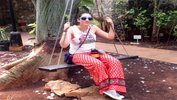A Roadmap For The Queer Study Abroad Experience
Posted on November 06, 2019
A Roadmap For The Queer Study Abroad Experience
Prior to studying abroad in Mérida, I would have never expected to fully develop, challenge, and expand a potentially controversial part of my identity—being queer. Many friends and acquaintances that envisioned Mérida to be a close-minded and remote place, offered many expected questions upon my return: “So, did anyone give you grief about holding hands with your Mexican girlfriend in public?” “Wasn’t it really hard to find any material for writing your LGBT blog for your abroad program?” “Wait, they have Tinder there?!” “Isn’t Yucatán a really conservative state?” The answers are yes, but deeper responses and related observations achieve nuance through interaction.
“Study abroad” is a phrase that seems a privileged pinnacle of higher education, a selling point of many colleges and universities, and a desirable, coveted experience. Speaking as a student from a liberal arts college on the east coast, this is especially true. The question that will undoubtedly reach you as a sophomore is: “So, are you studying abroad?”
Hence, in the midst of fellow students either simply following the study abroad trend or very intensely tailoring their plans to research projects, I sought to apply my Latin American Studies major and spend time in Latin America.
I positioned myself to explore queer life in Mérida, a city in a conservative state with a population of one million, by becoming an LGBT blogger for IFSA-Butler. Here I hope to share a series of observations and suggestions for navigating a niche community in a city while abroad:
Just because it’s not Mexico City or NYC, doesn’t mean it’s cut off from a progressing world. In locations with easy access to Internet, social media, apps, and websites with city events and schedules, connecting online with students, locals, activities, and even queer goings-on is essential for integration and awareness. Meeting people via social media, then in public, populated spaces, as I was advised, led to valuable friendships (one of which evolved into a relationship with my novia mentioned above) and acquiring insider LGBT knowledge.
Know when it’s worth pressing an identity or listening to understand local perspectives. This can be crucial to gaining a complementary perspective to that of the younger, generally more liberal-minded young students. My host grandfather, and even host father, frequently asked me whether I would consider going out with a yucateco boy—to which my host mother would diplomatically respond, “It all depends if she falls in love or not”— and I noticed several casual but, in my mind, significant jabs at maricón (gay/flamboyant/anti-macho) behavior on the part of different men mentioned off-handedly in the household. For the sake of a well-flowing, respectful, and sustainable conversation/relationship, I opted to be inquisitive and oriented towards understanding of local political dynamics rather than being inflammatory.
Be flexible and open to exploring local life and queer friendly spaces. I followed and embellished a “Gay Map of Mérida” that my friend Miguel discovered online as we began researching queer spaces upon arrival in Mérida. I stumbled upon an LGBT nightclub called Pride Disco near the outskirts of town, including a fascinating and very admirable drag queen beauty contest. While in La Habana, Cuba during spring break, we had the chance to see a very gay-embellished traveling dance show, Divino, which led us to rediscovering an LGBTTI resource center in Mérida, Buenas Intenciones, and I was ultimately able to attend an informative movie screening and conversation.
Travel abundantly, but in moderation enough to get to know the city where you are based. I suggest embarking on small adventures in order to gain a sense of what each day of the week holds at your home base. While I traveled to two other Mexican states, I wouldn’t have traded the discovery of a small queer-friendly Frida Kahlo-themed café with the help of a lesbian yucateca friend, nor the meanders around el centro downtown, engaging with strangers, musicians, passing Mayan priests, and other students. Consider purchasing a flexible exit plane ticket at the end of your semester, especially if school ends after your program does, as was my situation. Above all, given that “queerness” applies to so many nonconformist ways of thought, action, and organization, ride the waves and see where this quest for cross-culturally subversive and curious people leads.
With well-oiled social media resources, a readiness for unpredictability, a flexibility for who you end up spending time with and learning from, and a little cultural sensitivity, the away experience can be reciprocal and sustainable, and can plant a seed for future cultural exchange in many different circles of life.
So get “out,” in whatever stripe of bold identity you choose and want to explore cross-culturally, ¡y sigue adelante!

Author: Emily Talbot
